At the outbreak of the First World War, the territories of what would now be the Czech Republic and Slovakia —Czechoslovakia until 1992— were part of the Austro-Hungarian Empire, but their membership was due more to political issues than to a sense of identity with the Habsburgs. In fact, they had more affinity with the Russian Empire to which many Czechs and Slovaks had emigrated. Whether out of loyalty to their new homeland or out of fear of being imprisoned as a fifth column, these émigrés applied to form their own combat unit and fight alongside the Russian army. In turn, the Astro-Hungarian army recruited Czechs and Slovaks for its ranks, but they took advantage of the first clashes to surrender to their brothers who were fighting under the command of Tsar Nicholas II. What in the eyes of the Central Powers was a vulgar betrayal, in the eyes of the deserters was an opportunity to weaken the Habsburgs and, in this way, collaborate in the victory of the Allies to achieve their longed-for independence and become a country. The Austrians responded with a brutal repression that increased the nationalist sentiment of the Czechs and Slovaks. The deserters, initially imprisoned in Siberia, were allowed to join their brothers already fighting with the Russians to form the so-called Czechoslovak Legion —in 1917 they reached 60,000 members—. Everything was going to change in the blink of an eye... the Russian Revolution broke out .
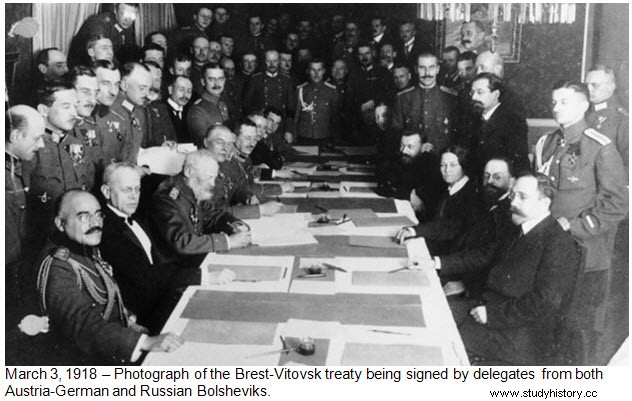
A particularly harsh winter, the famine caused in part by the resources allocated to the war, and boredom over a war that only brought news of defeat after defeat, caused a social upheaval that led to the abdication of Tsar Nicholas II. Germany, aware of Russia's internal instability, added fuel to the fire by facilitating the arrival of Lenin in Moscow, exiled in Switzerland. Leading the Bolsheviks, Lenin managed to come to power in November 1917 and began talks with the Central Powers to get Russia out of the war. With the upper hand and while the peace talks lasted, Germany launched a major offensive on the eastern front, the only ones who stood up to him were the members of the Czechoslovak Legion. In March 1918, with the signing of the Treaty of Brest-Vitovsk , Russia left the fight and the Czechoslovak Legion was in no man's land and without a country to fight for. His only option was to leave Russia to join the Allies on the Western Front, but both the land border and the Baltic were controlled by the Germans…they could only leave Russia through a Pacific port. The 60,000 members of the Czechoslovak Legion began a long journey of 9,000 kilometers to Vladivostok , where they would embark to cross the Pacific, reach the US and from there to France to continue fighting. The only possible transfer option was the Trans-Siberian .
The recent Russian neutrality and the agreements signed between the Bolsheviks and the Legion, allowed the latter to start the trip with the only setbacks typical of the transfer of such a large contingent and all the weapons that accompanied them. This relative tranquility was not going to last long... Russia staggered again with a civil war that confronted the Red Army —Bolsheviks — and the White Army —counterrevolutionaries —. In addition, the Austro-Hungarians demanded the surrender of the members of the Legion to shoot them as traitors. The fear that the Central Powers would break the peace treaty and the need for the weapons that the Legion was carrying, led the Red Army to assault the convoy. Unexpectedly, the Czechoslovak forces defeated the Bolsheviks. Aware of their new situation —in hostile land and alone—, they tried to secure their escape route:the railway line. They mounted artillery pieces on the wagons and advanced towards Vladivostok, maintaining control of the Trans-Siberian. In their effort to secure their way, they boarded a train that, to everyone's surprise, was carrying gold from the Imperial reserve.
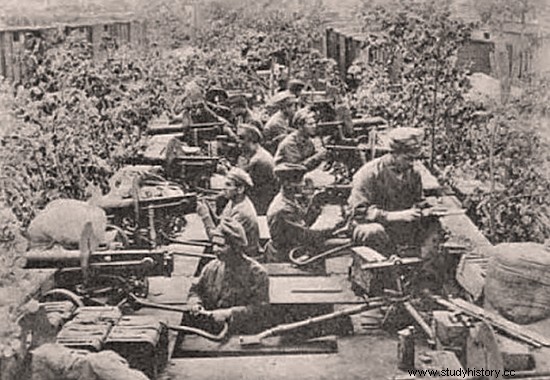
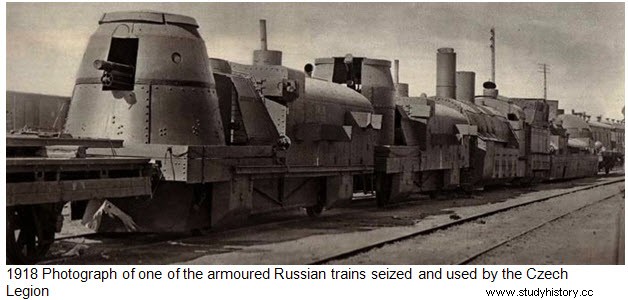
After the First World War, news began to reach the West of an «army without a country » who was trying to leave Russia. The Allies, so altruistic and merciful, decided to help them get out of that mousetrap by sending troops to Vladivostok to ship them, but the reality of that rescue mission was very different:the Legion was going to be used to stop the Bolsheviks and their communist revolution by supporting to the White Army. Thomas Masaryk —The future president of the Republic of Czechoslovakia— tried to take advantage of the sacrifice of his compatriots and negotiated with the Allies the independence of their territories and the creation of a new State... Czechoslovakia was born . With control of the Trans-Siberian Railway and the surrounding territories, the Allies landed in Vladivostok to secure the city and hold it until the Legion arrived.
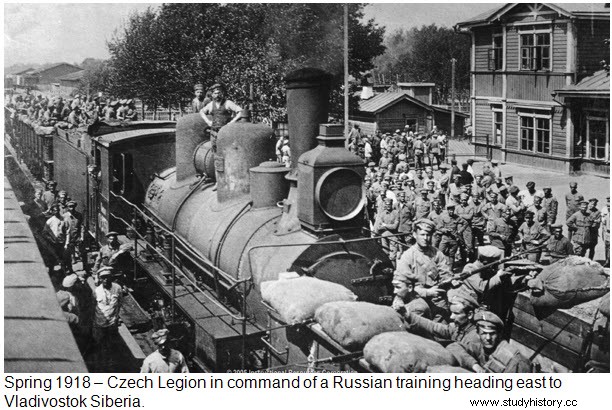
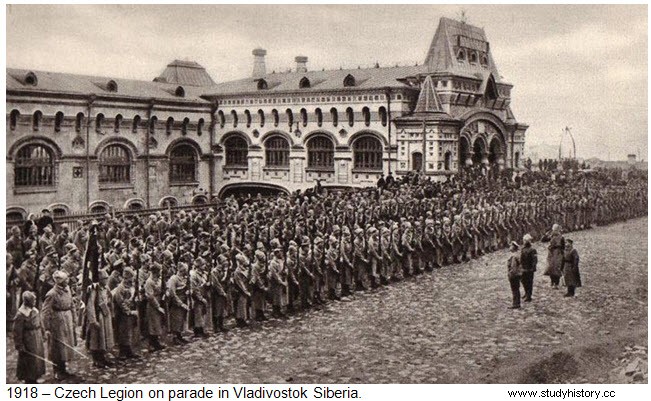
And like so many other times, everything would change again... the relentless advance of the Red Army threatened to trap the wanderers . So, they used the captured gold to negotiate with the Bolsheviks for their evacuation. By 1920, all the survivors of the Czechoslovak Legion - some 40,000 - had returned to their homeland, a country that did not exist when they embarked on that adventure. And here ends the story of this army without a country... almost. It is believed that of the eight wagons captured with gold, the Czechoslovaks only handed over what was in seven of them. The gold from the eighth wagon reached Czechoslovakia and was used to create Legiobanka (Legion Bench).
If you liked this story and you are still thinking about which book you are going to read this vacation lying on the beach or under the shade of a tree, I would recommend “Fire at will!:Surprising stories of the First and Second World War World Cup” that I published together with my friend Guillermo Clemares.

